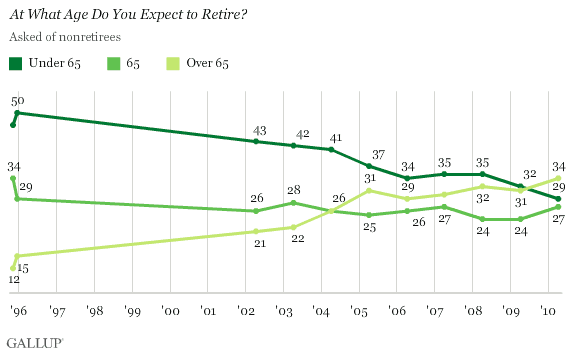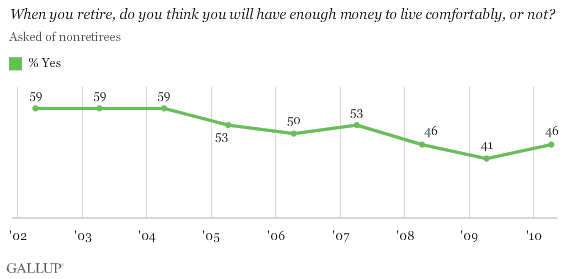PRINCETON, NJ -- Americans' projected retirement age has gradually increased over the past 15 years, with more than a third of nonretirees today saying they will retire after age 65, compared with 12% in 1995. This marks the first time Gallup has recorded more nonretirees saying they will retire after age 65 than before that age.

Gallup first asked nonretired Americans "At what age do you expect to retire?" in 1995, and has asked the question every year since 2002.
There has been a clear shift in retirement intentions over this period. In two 1995 polls, nonretirees were more likely to say they would retire before age 65 rather than either at 65 or after that milestone. Only 12% to 15% said they would extend their work life beyond age 65.
Now, 15 years later, Americans' retirement intentions are more dispersed. Thirty-four percent say they will retire after 65, while the percentage saying they will retire before that age has shrunk to 29%. Twenty-seven percent say they will retire at 65.
Why the Shift?
Many societal and economic forces may be causing this shift in retirement-age projections. The baby-boom generation is now approaching the traditional retirement age, and the expectations this large demographic group has about the nature and rewards of work may differ from the expectations of those who came before. Additionally, of course, the nation's workforce has faced a major recession in recent years, perhaps increasing the perceived value of retaining a job, given decreasing expectations of money for retirement because of the declining value of 401(k) and other retirement accounts.
Gallup's Economy and Personal Finance surveys have included a question each year since 2002 that helps address this latter point. Currently, 46% of nonretired Americans believe they will have enough money to live comfortably in retirement. This is up slightly from last year but well below what Gallup measured through most of the prior decade, including 59% in 2002 through 2004 who thought they would have enough money.

Those who do not expect to have enough money to live comfortably in retirement are somewhat more likely to anticipate working after age 65 than are those who expect to have enough money -- although these differences are not large.
Bottom Line
It could be good news for the American economy if workers do follow through on their intentions, as measured in Gallup's surveys, and continue to postpone retirement. Some economists have projected a need for additional labor to keep the economy going in the years ahead -- and older workers could help fill that need. Additionally, the longer Americans work, the more they contribute and the less they drain from the Social Security and Medicare systems -- good for the federal budget deficit situation. Working longer may also help Americans' individual financials and thus, in turn, help increase overall consumer spending.
The impact that working beyond traditional retirement age has on individual wellbeing is less clear. Some could argue that working helps older Americans stay active, mentally engaged, and fulfilled. Others could point to the positive psychological benefits of retirement -- the traditional "golden" years during which Americans relax and enjoy family and leisure time. Future Gallup analysis will examine these hypotheses.
Results are based on telephone interviews with 1,020 national adults, aged 18 and older, conducted April 8-11, 2010. For results based on the total sample of national adults, one can say with 95% confidence that the maximum margin of sampling error is ±4 percentage points.
For results based on the sample of 666 nonretirees, the maximum margin of sampling error is ±4 percentage points.
Interviews are conducted with respondents on landline telephones (for respondents with a landline telephone) and cellular phones (for respondents who are cell phone only).
In addition to sampling error, question wording and practical difficulties in conducting surveys can introduce error or bias into the findings of public opinion polls.
